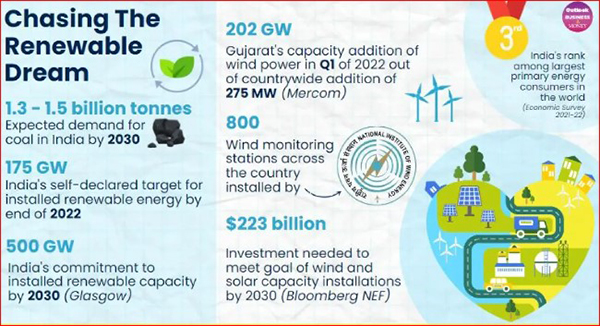Date: 31/03/2023
Relevance: GS-3: Economic Development, Biodiversity, and Environment.
Key Phrases: Renewable Energy, imported solar panels, Solar Parks, cumulative capacity, Protectionism, access to its market, carbon-free.
Context:
- In the wake of the Covid-19 pandemic, the Indian government launched the Atmanirbhar Bharat (Self-Reliant India) initiative to promote self-reliance and reduce the country's dependence on imports.
- This policy shift, which is arguably India's biggest since it gave up its autarkic dreams in 1991, has been met with both praise and criticism.
Key Highlights:
- One of the key areas where self-reliance is being promoted is the field of renewable energy, specifically solar power.
- As part of its energy transition, the Indian government has set an ambitious target of achieving 500GW of carbon-free capacity by 2030, which is more than four times the current level of about 122GW.
- To achieve this goal, the government is using public funds to spur the local production of solar panels by private players.
- In the second round of the incentive scheme, around a dozen companies were allotted approximately Rs. 14,000 crore to produce solar panels and other equipment necessary for converting sunshine into electricity.
- The idea is to reduce India's dependence on imported solar panels, which accounted for over 80% of the panels set up in India until last year.
- To dissuade imports, India has implemented a big tariff shield, including a 40% import duty on photovoltaic modules and 25% on cells, starting in 2022-23.
- The government hopes that this move will encourage domestic production and create jobs within the country.

Do you know?
- India stands 4th globally in Renewable Energy Installed Capacity (including Large Hydro), 4th in Wind Power capacity & 4th in Solar Power capacity (as per REN21 Renewables 2022 Global Status Report).
- As of 31-10-2022, 56 Solar Parks have been sanctioned with a cumulative capacity of 39.28 GW in 14 states.
What is Import Substitution?
- Import substitution is a policy that aims to replace foreign goods and services with domestically produced ones.
- It involves government intervention to promote local industries and reduce dependence on imports.
- The Atmanirbhar Bharat initiative in India is an example of import substitution policy, which seeks to make India self-reliant in various sectors.
Pros:
- Reduced dependence on foreign countries: Import substitution policy can help reduce a country's dependence on foreign goods and services, making it less vulnerable to supply disruptions or geopolitical tensions.
- Boost for domestic industries: By promoting local industries, import substitution policy can lead to increased investment, job creation, and economic growth. It can also stimulate innovation and technology development in the domestic industry.
- Strategic self-reliance: Import substitution policy can be strategically important for sectors that are critical to national security or sovereignty.
Cons:
- Inefficiency: Import substitution policy can lead to inefficiencies in the domestic industry, as local producers may lack the economies of scale or technological capabilities of their foreign competitors. This can result in higher prices for consumers and lower quality products.
- Protectionism: Import substitution policy can be seen as protectionist, as it involves trade barriers and restrictions that limit competition and innovation. This can lead to a lack of competitiveness in the long term.
- Limited market access: Import substitution policy can limit access to foreign markets for domestic producers, which can hurt exports and limit potential growth opportunities.
- Import barriers prevent the Indian solar industry from taking advantage of the global market, which would allow it to achieve economies of scale and lower costs.
- By restricting imports, the local market for solar equipment is allowed to function at artificially elevated price levels.
- It can lead to retaliation from trading partners if they feel that India is unfairly restricting their access to its market.
Conclusion:
- While import substitution policies may seem attractive, they may not be the best way to achieve the goal of reducing India's carbon emissions.
- The government's focus on self-reliance in the solar energy sector may result in artificially high prices and slow progress toward the target of 500 GW of carbon-free capacity by 2030.
- Instead, India should focus on promoting competition and innovation in the solar industry to achieve lower costs and increase efficiency.
- This would enable India to take advantage of the global market and achieve its clean energy goals at the lowest possible cost.
Source: Live Mint
Mains Question:
Q. Discuss the rationale behind India's policy of import substitution and its impact on the economy, with a specific focus on the renewable energy sector. Analyze the potential benefits and drawbacks of this policy. (250 Words).























